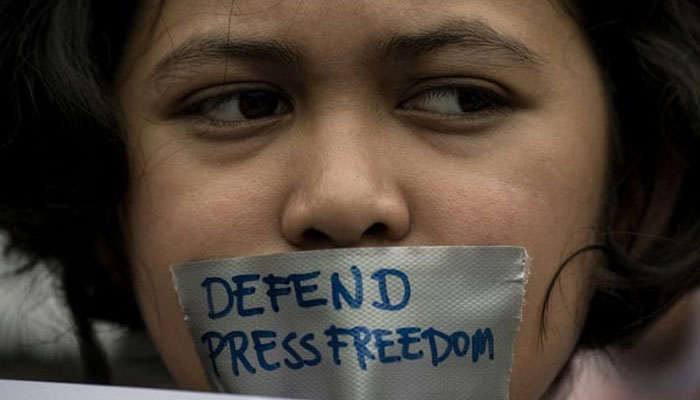Punjab’s flawed defamation law
The bill provides an overbroad and highly problematic definition of ‘journalist’ and ‘editor’
On May 20 (2024), the Punjab Assembly passed the highly controversial Punjab Defamation Bill, 2024 – despite strong protest by the opposition parties in the assembly.
The Join Action Committee (JAC) of media stakeholders comprising APNS, CPNE, PBA, PFUJ, and AEMEND rejected the bill. On May 21, more than 80 civil society organizations, journalists, lawyers and concerned citizens termed the bill “draconian and Regressive” and rejected it.
The Statement of Objective and Reasons of the Bill state that this bill “envisages legal protection from false, misleading, and defamatory claims made via print, electronic, and social media against public officials and private citizens.”
The statement further says, “[t]he bill is necessary to contain such unwarranted criticism and dislike for a person or authority.” However, the definition of ‘defamation’ in the bill goes beyond the standard definition of defamation and includes a publication, broadcast or circulation which “may have the effect of injury…” This part of the definition is vague and open for misinterpretation and misuse.
The bill provides an overbroad and highly problematic definition of ‘journalist’ and ‘editor’. This is important because the bill holds both the journalist and the editor responsible for any alleged defamatory publication, broadcast or statement. This may include technical staff such as cameraman, developer, and designer of a social media post. The definition of ‘editor’ even covers “user of a social media account or medium’. This would essentially include admin or members / participants of a public group on a social media platform. It is immaterial whether they endorse / support that publication or its circulation or not.
Apparently, the bill intends to protect public officials and private citizens from false, misleading, and defamatory claims. In reality, it is designed to provide blanket immunity to the holders of top offices of the state against justified and true criticism also. These officeholders are: the president, governor, chief justice and judges of the Supreme Court, CJ and judges of the Lahore High Court, prime minister, leader of the Opposition in the National Assembly, NA speaker, Senate chairman, chief minister, leader of the Opposition in the provincial assembly, speakers of provincial assemblies, chairman and members of the ECP, the auditor general, chairman, Joint Chiefs of Staff Committee, the army chief, naval chief and airforce chief.
In principle, except judges, holders of all offices are either elected by representatives of the people or appointed by the elected government. All of them are being paid through public funds. Therefore, they are accountable to the public and are required to be open to public scrutiny and criticism. Providing an extraordinary power to them to claim pecuniary damages (of minimum Rs3,000,000) from the ordinary public and journalists for their political expression and criticism will further enforce censorship in media and society.
The Islamabad High Court in Shaila Mustafa v Federation of Pakistan through Secretary M/o Interior, etc — order dated 21-02-2022 — had held: “[g]overnment and public office holders are in a dominant position. They have chosen their respective professions knowing that they would be exposed to rigorous scrutiny not only by the press but the public at large. Therefore, reputation of public office holders cannot be protected through abuse of oppressive state power. The limits of acceptable criticism are wider for a public official than the private citizens.”
The CJP and the chief justices of the high courts and judges of the Supreme Court and high courts already enjoy the power, though controversial in principle, of contempt of court. Do judges need to have any other legal support for their protection against alleged defamatory statements? Lord Atkin in Ambard v Attorney-General for Trinidad and Tobago [1936] 1 All ER 704] stated: “[b]ut whether the authority and position of an individual judge or the due administration of justice is concerned, no wrong is committed by any member of the public who exercises the ordinary right of criticizing in good faith in private or public the public act done in the seat of justice. Justice is not a cloistered virtue: she must be allowed to suffer the scrutiny and respectful even though outspoken comments of ordinary men.”
Newspaper, television and news-sites / websites are different mediums. Moreover, different sets of registration laws are applicable to newspapers and television channels.
However, the bill defines ‘newspaper’ as “a newspaper and includes a website, application or other social media platform containing public news, intelligence or occurrences or remarks or observations or containing only, or principally, advertisements, printed or electronically or digitally issued for distribution to the public and published or issued periodically or in parts or numbers, and includes such other periodical works as the government may, by notification in the official Gazette, declare to be a newspaper.”
This definition totally disregards the distinction between print media, broadcast media and web-based / internet-based platforms. Equating them with each other is illogical. This will also give rise to several legal and administrative questions concerning registration and licencing regimes for different medium, variety of regulatory frameworks, rights of workers, etc.,
Damages, as provided by the bill, are highly objectionable — particularly, when the tribunal / court is empowered to award decree to pay minimum three million rupees as General Damages without providing due right of reply the defendant and proper adjudication of the matter.
The bill (Section 4) also does not recognize two highly important and internationally recognized defences against the claim of defamation: one, tendering proper apology and an offer to publish the same by the defendant; and two, offering to print or publish a contradiction or denial in the same manner and with the same prominence by the defendant.
Importantly, these two internationally recognized and accepted defences are part of the Defamation Ordinance 2002, which is being repealed through this bill.
Moreover, the bill (Section 12) bars “the parties to the proceedings before the tribunal, their counsel and legal advisers, witnesses, the member of the tribunal, court staff, or any other third person) shall be permitted to comment or make any statement relating to any proceedings pending before the tribunal under this Act.” This bar is despite the recognition of ‘qualified privilege’ as a defence in Section 6 of the Bill. ‘Qualified privilege’ is defined as “fair and accurate publication or broadcast of parliamentary proceedings, or judicial proceedings which the public may attend and statements made to the proper authorities in order to procure the redress of public grievances shall have the protection of qualified privilege.” These provisions are self-contradictory in nature.
Section 8 of the bill provides for the establishment of special tribunals to adjudicate claims of defamation. In principle, a normal judicial system should be empowered to deal with these cases instead of setting up parallel judicial structures. Special tribunals will shake public confidence about the administration of justice by the normal court system.
The law also invents the role of provincial government in the appointment of judges for these tribunals which are in fact equivalent to the single bench of the High Court. This is against the existing constitutional scheme for appointment of judges of the high courts. Governmental intervention in the appointment of judges of the tribunal will compromise the principle of fairness and impartiality – as the government is intended to be a beneficiary of this bill — as well as amount to executive’s interference in the judicial process. This is also infringement of Article 175 of the constitution which separates the judiciary from the executive.
Section 11 provides “summary proceedings”, as mentioned in Order 37 of the Civil Procedure Code, for adjudication of claims. Defamation is neither a financial dispute between the parties nor involves any negotiable instrument. Therefore, summary proceedings are not the appropriate process for adjudication of defamation claims.
Otherwise, there is a likelihood that case may be decided without giving ‘due opportunity of being heard’ to the defendant. Moreover, under Section 13, precondition of payment of preliminary damages for acceptance of leave to defend is equivalent to ‘guilty even before the trial.’ Besides, a defamation claim can be related to a matter of public importance and not limited to a dispute between two individuals. In such cases, summary proceedings can vitiate the whole of purpose of justice and fairness in the proceedings.
Section 3 provides that a person may file a defamation claim without proof of actual damage or loss. So, it does not matter if the information published is correct and true. Moreover, under Section 17 of the bill, the claimant is not required to establish his/her reputation. The claimant needs to merely claim that the publication has resulted in defamation. The defendant has to prove truthfulness of the publication after grant of leave to defend and payment of minimum of Rs3,000,000 as general damages. This is equivalent to ‘guilty unless proven innocent’ and opposite to the presumption of ‘innocence unless proven otherwise.’ Essentially, the bill/act has too many technical flaws and must be withdrawn.
The writer is an Islamabad-based lawyer, with expertise in media and internet laws. He tweets/posts @aftabalam_77
-
 Hailee Steinfeld Details Preparations Ahead Of Welcoming First Kid With Josh Allen
Hailee Steinfeld Details Preparations Ahead Of Welcoming First Kid With Josh Allen -
 Shocking Details Revealed About Gunman 'Austin Tucker' Shot Dead At Trump’s Resort 'Mar-a-Lago'
Shocking Details Revealed About Gunman 'Austin Tucker' Shot Dead At Trump’s Resort 'Mar-a-Lago' -
 Queen Camilla Meets Gisèle Pelicot, Sends Powerful Message To Victims As Andrew's Scandal Deepens
Queen Camilla Meets Gisèle Pelicot, Sends Powerful Message To Victims As Andrew's Scandal Deepens -
 Cancer-stricken King Charles At Breaking Point?
Cancer-stricken King Charles At Breaking Point? -
 Andrew Leaves King Charles No More Moves To Play: ‘Can’t Just Say We Got Nothing’
Andrew Leaves King Charles No More Moves To Play: ‘Can’t Just Say We Got Nothing’ -
 Sterling K. Brown Explains How Sharing His Kids' Photos On Social Media Can Keep Them Safe
Sterling K. Brown Explains How Sharing His Kids' Photos On Social Media Can Keep Them Safe -
 Keir Starmer Gives Major Advise To King Charles Amid Andrew Scandal
Keir Starmer Gives Major Advise To King Charles Amid Andrew Scandal -
 Nick Reiner Pleads Not Guilty In Famous Parents' Double Murder Which Shocked The World
Nick Reiner Pleads Not Guilty In Famous Parents' Double Murder Which Shocked The World -
 Benicio Del Toro On Losing Mom In Chldhood: 'I’m Still Dealing With It'
Benicio Del Toro On Losing Mom In Chldhood: 'I’m Still Dealing With It' -
 More Than 500,000 Without Power As Blizzard Hits US Northeast
More Than 500,000 Without Power As Blizzard Hits US Northeast -
 Winona Ryder Lands Secret Role In 'Wednesday' Season Three, Marking Reunion With Tim Burton
Winona Ryder Lands Secret Role In 'Wednesday' Season Three, Marking Reunion With Tim Burton -
 Andrew, Fergie’s Life Without The Bells And Whistles Turns Grimmer: ‘A Lot More Was Happening’
Andrew, Fergie’s Life Without The Bells And Whistles Turns Grimmer: ‘A Lot More Was Happening’ -
 Nicole Kidman And Keith Urban's Divorce Drama Deepens As Teen Daughters 'stick' By Their Mother's Side
Nicole Kidman And Keith Urban's Divorce Drama Deepens As Teen Daughters 'stick' By Their Mother's Side -
 William, Kate Desperate To Make Public Statement Distancing Themselves From Andrew
William, Kate Desperate To Make Public Statement Distancing Themselves From Andrew -
 Charli Xcx Details Boozy Second Wedding To The 1975's George Daniel: 'Everyone Was Hungover'
Charli Xcx Details Boozy Second Wedding To The 1975's George Daniel: 'Everyone Was Hungover' -
 Gracie Abrams Follows 'Kylie Jenner Playbook' With Paul Mescal Romance
Gracie Abrams Follows 'Kylie Jenner Playbook' With Paul Mescal Romance




